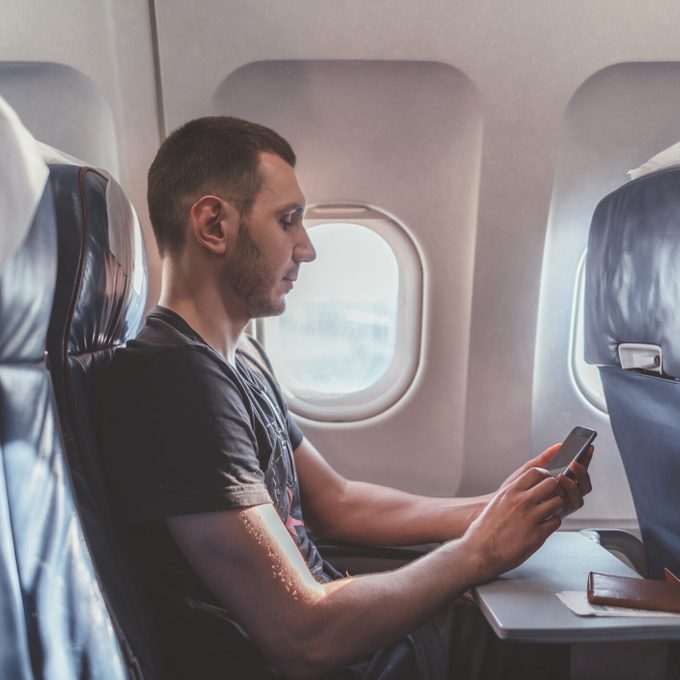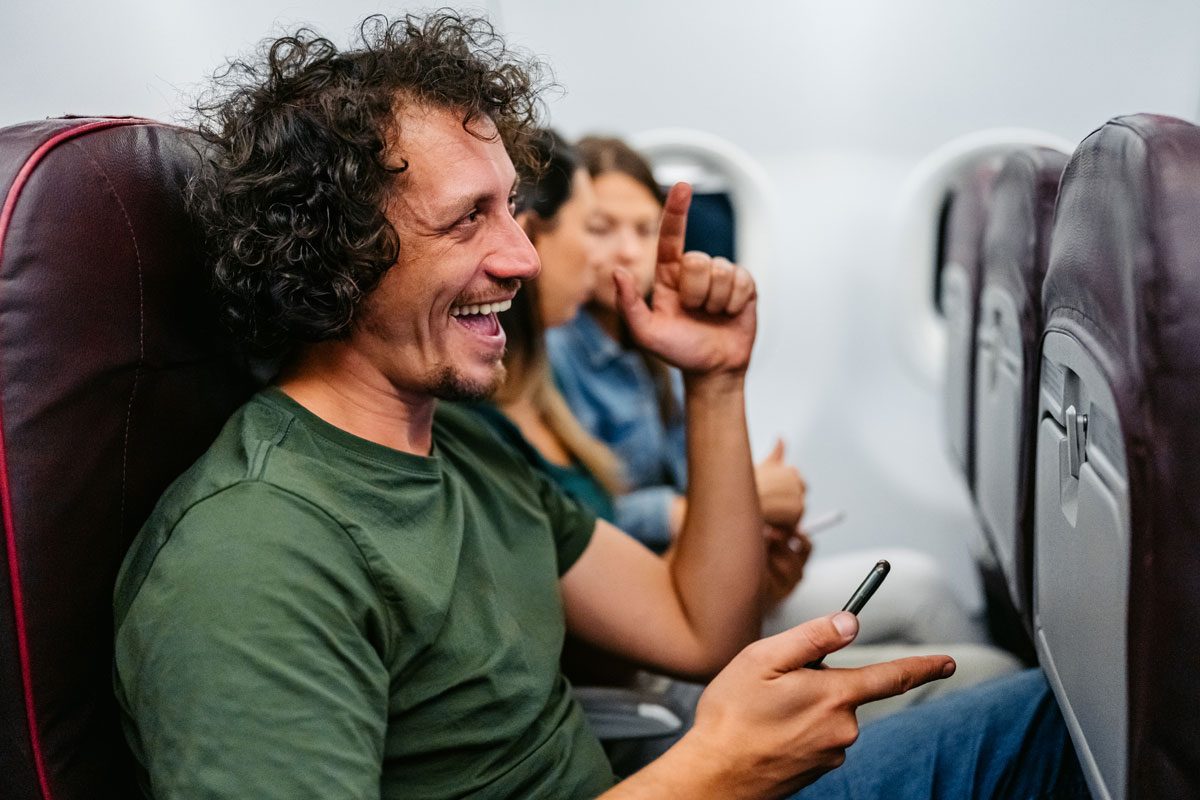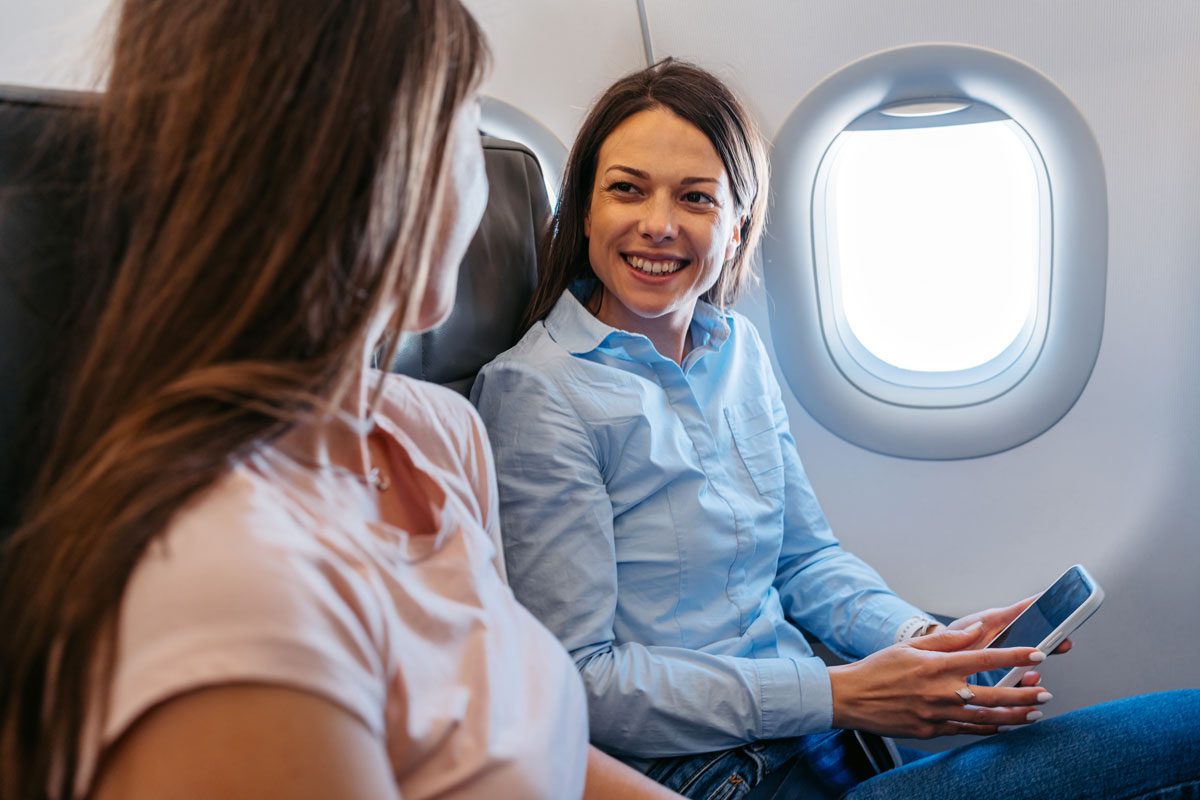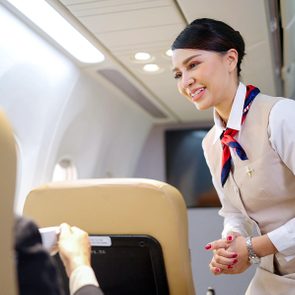A whopping 83% of people say they would rather sit next to the airplane bathroom than sit next to someone exhibiting this behavior

What You Need to Know About “Speaker Scum” Before Your Next Flight

Picture this: You’ve made it through the gauntlet of airport parking, security checkpoints, luggage checks and boarding. You’re finally safely ensconced in your seat (and if you’re really lucky, you’re next to an empty middle seat). Just before takeoff, you hear a booming voice. But it’s not the pilot announcing your departure—it’s the dude in the row behind you who decided that not only should he listen to monks chanting death metal while you race down the runway but so should the rest of the plane … courtesy of his phone speaker. Oof. Your flight is already off to a rough start, and you haven’t even hit any turbulence.
Well, there’s a new name for this type of person, according to Reddit: speaker scum. It may sound harsh, but passengers are fed up.
“I think everyone’s got a similar story! People doing annoying things is part and parcel of public transportation—which includes flying,” says Jan Goss, a business etiquette expert with more than 30 years of experience. “But that doesn’t excuse the bad behavior, and we can all learn to be more polite travelers.”
We talked to Goss and Cecily Anderson, a flight attendant for a major U.S. airline, about this increasingly common airplane etiquette faux pas. Read on to find out exactly what speaker scum encompasses, why this behavior has become so common and how you can reclaim some peace at 30,000 feet.
Get Reader’s Digest’s Read Up newsletter for more etiquette, travel, tech, cleaning, humor and fun facts all week long.
What is “speaker scum” behavior, exactly?

As noted above, “speaker scum” describes travelers who blast their music on speakerphone while at the airport or on board a plane. But that’s not all—they may also use their speakerphone to watch YouTube clips, TikTok videos or movies, or have a phone conversation, at full volume, with zero regard for the people around them. Whether it’s in the crowded terminal or the cramped cabin of an airplane, the result is the same: annoyed passengers silently (or not so silently) fuming.
This bad habit of not using earbuds or headphones when listening to a phone or computer is increasingly irritating air travelers. In fact, this was the second most common airplane annoyance reported in a 2024 JBL survey about travel habits. (If you’re curious, the top one was when the person sitting ahead reclines their seat all the way back.)
How common is this?
Way too common for our liking! According to the JBL survey, 35% of Americans say they’ve listened to audio without headphones while traveling “when they really need to hear something.” Another 26% consistently do but keep their volume low, and a shameless 6% do it all the time and see no problem with it. But at the same time, 83% of survey respondents said they consider wearing headphones essential travel etiquette and said they’d rather sit by the bathroom than by someone on a speakerphone call.
“It’s that ‘rules for thee but not for me’ attitude that really gets me,” Anderson says. “People will have a fit about someone else doing it, but when they feel like it’s important for them, then suddenly everyone needs to respect that.”
Goss adds: “The problem isn’t just the noise—it’s the disregard for others’ feelings. Airports and planes are not your living room, yet some people insist on acting like it is.”
Why are more people suddenly doing this?
The most obvious answer is that technology is more accessible than ever before, and people are using it in every aspect of their lives, including travel. However, there are a few additional reasons that factor into the uptick in this specific brand of rude behavior, according to Goss.
Phone addiction
Some of us are online so much that our smartphones might as well be attached to our hands. This means that many people no longer think twice about using them loudly in public because they are so used to using them everywhere.
“Phone etiquette isn’t just a travel problem—it’s an everywhere problem,” Goss adds.
Poor planning
Headphones are no longer a luxury item. In fact, nearly half of survey respondents said that earbuds and headphones are the top travel item they cannot live without. Even so, some folks will inevitably forget them, lose them or simply not use them. And rather than go without using the audio on their phone, they choose to inconvenience others.
Shifts in social norms
Blame the pandemic or our increasing casualness in daily life, but some people seem to have forgotten the unwritten rules of etiquette and public courtesy. Others, overwhelmed by the chaos of travel, might see sacrificing others’ comfort as acceptable so they can self-soothe with their phones.
“I do feel like I’ve seen a general downward slide in social politeness over the past 10 years,” Anderson says.
What are airlines doing to combat speaker scum?
While airlines haven’t launched full-scale campaigns against this behavior, there are signs of pushback. Many airports and carriers now include announcements urging passengers to use headphones while watching videos or listening to music. Flight attendants may also politely (or firmly) remind offenders to keep it down, Anderson says.
Some airlines, like Delta, have added noise-canceling headphones to their first-class offerings or made them available for purchase in flight, subtly nudging passengers to adopt more courteous practices. Delta has also added a headphone usage advisory to its in-flight entertainment page and website, asking passengers to use headphones or earbuds with personal devices “for the comfort of everyone around you.” (Translation: Take a hint, people!)
What should you do if you encounter this behavior?

“Always lead with kindness and empathy,” Goss says. “It doesn’t hurt to politely ask, ‘Would you mind turning the volume down? It’s a bit distracting.’ Many people aren’t intentionally rude; they just aren’t thinking.”
One Redditor uses this strategy: “I keep several of the free airline headsets in my bag. Offering them to someone doing this usually gets the point across.”
If a subtle approach doesn’t work, think twice about getting more forceful with someone exhibiting speaker-scum behavior. “Confronting someone mid-flight isn’t the best idea—’air rage’ is a thing,” Anderson says. Instead, ask a flight attendant for help. “We are trained to mediate these situations,” she says. But just be aware that they won’t force someone to turn off their volume or take more extreme measures. If the other person refuses to listen, you may have to put up with the annoying behavior.
But perhaps the best thing you can do is protect your hearing and your sanity by bringing your own noise-canceling headphones or earplugs, Goss says. While it’s unfair that you should have to drown out someone else’s noise, these tools can be a lifesaver.
What’s the polite way to manage your own phones and devices when flying?
Want to make sure you’re not that person? Follow these simple rules so that you don’t fall into the speaker-scum category:
-
Always use your headphones. If you’re doing anything that requires audio, plug in your earbuds. Bluetooth or wired, it doesn’t matter—just make it private.
-
Put your phone on mute. When you put your phone on airplane mode, also silence it. Alarms and notification pings can be just as annoying as phone calls. If silent feels too scary, just set it to vibrate.
-
Limit phone calls. You shouldn’t be making calls on the airplane, but be selective about making calls in the airport. And when you do make one, hold the phone up to your ear. Airports are noisy, so listening to a booming voice over speakerphone or yelling into your earbuds is doubly irritating.
-
Find a quiet area. If you need to make a quick phone call in the boarding line, so be it, but do your best to keep it brief. Otherwise, step aside to a quiet corner before making a call.
-
Follow all the phone rules. Each airline has policies about the use of phones or other devices inside the plane. Make sure you understand and follow them. Not sure? Ask a flight attendant.
Are there any exceptions to this rule?
Of course, some exceptions exist. A toddler quietly watching Bluey on an iPad without headphones might be less disruptive than a full-blown meltdown. For parents, it’s often a trade-off between mildly annoying noise and total chaos. That said, offering kid-friendly headphones—and practicing with your child beforehand—can minimize disturbances for everyone, Goss says.
“At the end of the day, just do your best to be comfortable while also empathizing with others’ needs,” Goss says. Traveling is stressful, but it doesn’t have to be unbearable. By keeping your volume down and respecting the shared space, you can make the journey a little more pleasant for yourself and everyone around you. And if you encounter someone who hasn’t gotten the memo? Handle it with kindness. After all, we’re all just trying to get to our destinations in one piece.
Why trust us
Reader’s Digest has published hundreds of travel stories that help readers explore the world safely, easily and affordably. We regularly cover topics such as the best places to visit (and the best times to visit them), tips and tricks to zoom through airport security, flight-attendant secrets, hotel-room hacks and more. We’re committed to producing high-quality content by writers with expertise and experience in their field in consultation with relevant, qualified experts. We rely on reputable primary sources, including government and professional organizations and academic institutions as well as our writers’ personal experiences where appropriate. We verify all facts and data, back them with credible sourcing and revisit them over time to ensure they remain accurate and up to date. Read more about our team, our contributors and our editorial policies.
Sources:



